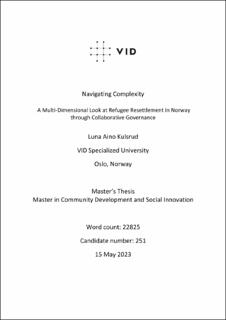Navigating complexity. A multi-dimensional look at refugee resettlement in Norway through collaborative governance
Master thesis
Permanent lenke
https://hdl.handle.net/11250/3096861Utgivelsesdato
2023Metadata
Vis full innførselSammendrag
This thesis thoroughly explores the use of collaborative governance in the resettlement of refugees in Norway. With the global refugee crisis, finding effective ways to manage resettlement is essential. The study evaluates key elements of this model, such as leadership, interdependence, institutional design, inclusiveness, power distribution, trust building, and legitimacy. It also examines the roles of flexibility and values within the governance model. To gain a comprehensive understanding of the historical and current scenarios of immigration and refugee settlement in Norway, the research methodology combines interviews and document analysis. This allows for an in-depth exploration of the challenges and opportunities of the collaborative governance model. This study emphasises how important it is for different groups to communicate effectively, share common goals, manage expectations, and prioritise collaborations. It also stresses the need for humanitarian values, community-building, flexibility, and adaptability during resettlement. Furthermore, the study acknowledges the difficulties in satisfying the various needs and expectations of all parties involved and dealing with conflicting values. Finally, it suggests areas for future research and discusses how these findings could impact refugee resettlement policies and practices.
